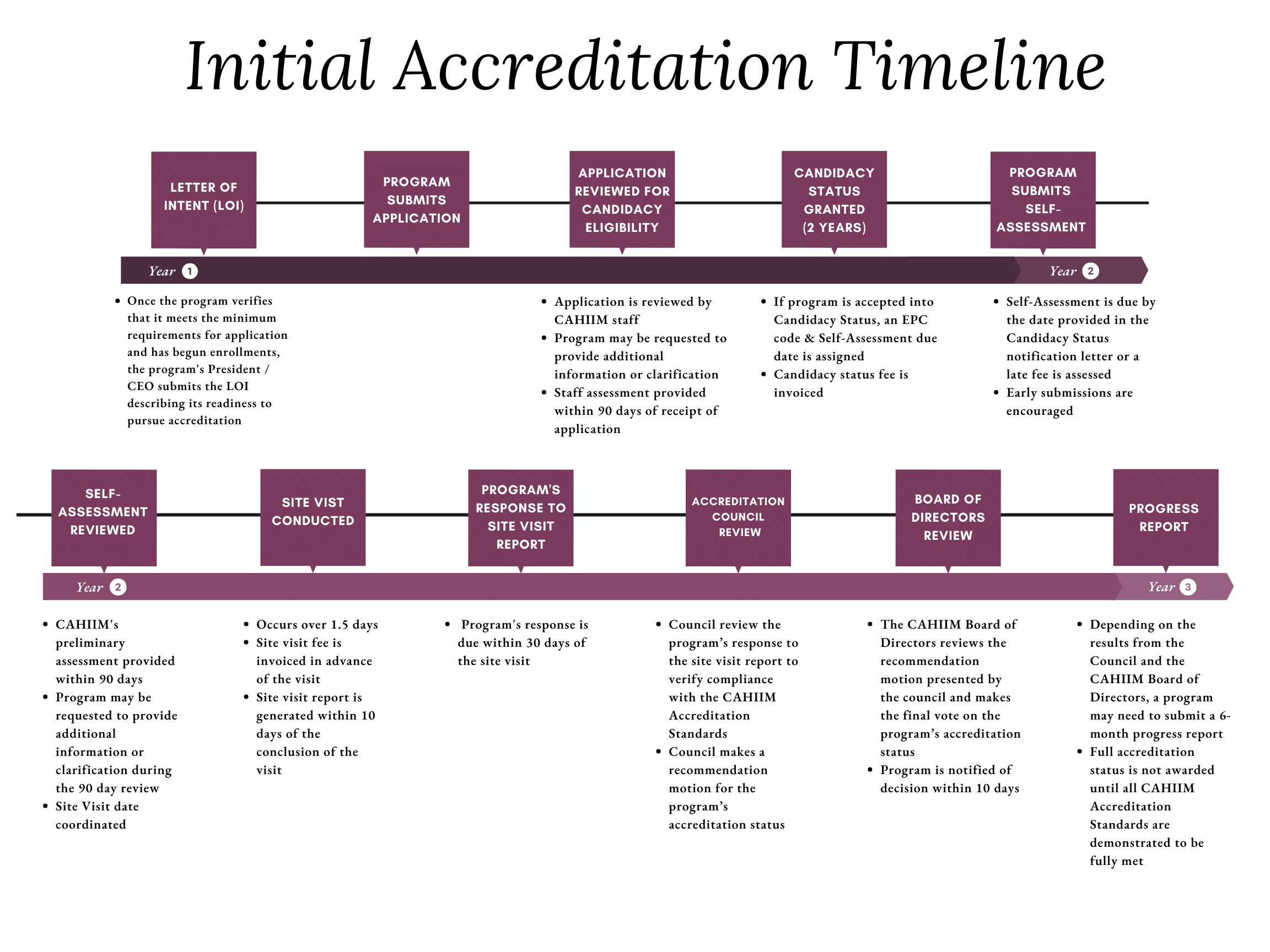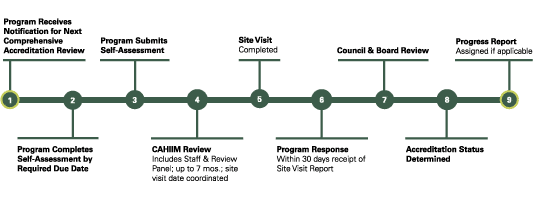Health Informatics
Health informatics is an interprofessional specialty that exists at the confluence of three major domains: health, information science and technology, and social and behavioral science. As with all other health professions, health informatics is the practice of using data, information, and knowledge for clinical care, scientific inquiry, decision making, and problem solving to improve the health, safety, and effectiveness of those working and being cared for within the system of health care delivery.
Health Informatics Accreditation
Health Informatics education occurs in academic programs awarding baccalaureate, masters, and professional doctoral degrees. The master’s degree has a set of Accreditation Standards that ensure the quality of the education. Standards for the baccalaureate and professional doctorate are under development. Students entering these programs come from a variety of backgrounds, e.g., engineering, computer science, healthcare, and others. Education may also occur as a specialty within clinical degree programs, e.g., medicine, nursing, pharmacy, public health, dentistry, and others. CAHIIM considers informatics to be health informatics when used for healthcare delivery to be essentially the same regardless of the group involved.
Clinical Informatics is concerned with information use in health care by clinicians. Clinical informatics includes a wide range of topics ranging from clinical decision support, visual images, clinical documentation, provider order entry systems, information system design, information system implementation, and information system adoption issues.
Health Informatics professionals may practice in health care delivery, health information systems and imaging industry, health informatics education programs, and health informatics standards and policy development.
Standards
Health Informatics Accreditation Standards
Health Informatics is an interdisciplinary field that studies and pursues the effective uses of biomedical data, information, and knowledge to improve human health. Health informatics graduate programs focus on information systems, informatics principles, information technology, leadership and professionalism as applied to the continuum of healthcare delivery. Health informatics graduate programs demonstrate uniqueness by offering varied options for practice and/or research.
CAHIIM Health Informatics Accreditation Standards incorporate foundational program components such as Sponsorship, Systematic Planning, Program Autonomy and Governance, Curriculum and Program Resources.
Curriculum Requirements
Health Informatics Competency Driven Education
Programs are encouraged to review their health informatics curriculum and compare current curriculum content with AMIA’s core competencies (Foundational Domains). The AMIA Foundational Domains are intended to be used for health informatics curriculum development and accreditation assessment for masters level graduate education in health informatics education.
For the purposes of CAHIIM Accreditation, students in the health informatics discipline should have working knowledge and competency of these foundational domains as they define and affect the practice of health informatics. The program graduate is expected to demonstrate the knowledge, skills, and attitudes that exist in the following domains:
- Health
- Information Science and Technology
- Social and Behavioral Science
- Health Information Science and Technology
- Human Factors and Socio-technical Systems
- Social and Behavioral Aspects of Health
- Social, Behavioral, and Information Science and Technology Applied to Health
- Professionalism
- Interprofessional Collaborative Practice
- Leadership
As with all other health professions, the work of health informaticians affects the health, safety, and effectiveness of those working and being cared for within the system of health care delivery.
CAHIIM Self Evaluation Tool (CSET)
The CAHIIM Self Evaluation Tool is an Excel workbook that is used for CAHIIM program curriculum assessment. It is a mapping document that describes what is learned and observed in a Masters of Health Informatics program. The CSET also includes a heat map that will allow the program to see what their areas of concentration/focus are in the AMIA’s Foundational Domains.
The CAHIIM Self Evaluation Tool is required for the CAHIIM application and used to assess the program curriculum once the program is in Candidacy for CAHIIM accreditation.
Accreditation Scholarship
Health Informatics Accreditation Scholarship
Website Requirements
Website Publication Requirements
CAHIIM is recognized by the Council for Higher Education Accreditation (CHEA). As part of that recognition, accredited programs are required to publish student outcomes, in addition to our other public disclosure requirements.
The following items must be located on the main “landing page” for the academic program, rather than on sub-pages which require clicking a link from the landing page. It is, however, acceptable for this information to exist on expandable/collapsible sections of the landing page.
Programs submit the link to their landing page as part of their Annual Program Assessment Report (APAR).
For questions about these requirements, please contact info@cahiim.org.
Required Items
1. CAHIIM Seal
To obtain a copy of this image file, log into the APAR system and clicking “Resources”, then “CAHIIM accredited Logo graphic files.zip”
2. Accreditation Statement
The [HEALTH INFORMATION MANAGEMENT/HEALTH INFORMATICS] accreditor of [COLLEGE NAME] is the Commission on Accreditation for Health Informatics and Information Management Education (CAHIIM). The College’s accreditation for [ASSOCIATE/BACCALAUREATE/MASTER] degree in [HEALTH INFORMATION MANAGEMENT/HEALTH INFORMATICS] has been reaffirmed through [YEAR OF NEXT ACCREDITATON CYCLE]. All inquiries about the program’s accreditation status should be directed by mail to CAHIIM, 200 East Randolph Street, Suite 5100, Chicago, IL, 60601; by phone at (312) 235-3255; or by email at info@cahiim.org.
3. Student achievement/outcomes
Program must post program graduation rate AND employment rate, as well as at least one (1) of the following:
i. retention rate
ii. academic transfer
iii. graduate school entry
iv. 4-year undergraduate program entry/ Academic progression rate
v. student satisfaction rate
vi. certification exam pass rate (if applicable)
These outcomes must list the date and can be no older than the last full academic year.
Program can post as many more outcomes as desired; these are minimum requirements.
Definitions
CAHIIM does not require programs to use the following definitions, as these will not be applicable to all programs. If a program’s institution defines a particular rate in a different way, the program may use their institutional definition. The following definitions serve as examples.
Graduation rate – the percentage of a school’s first-time, first-year undergraduate students who complete their program within 150% of the published time for the program. For example, for a four-year degree program, entering students who complete within six years are counted as graduates (Definition from FAFSA). This cannot simply be a total number of graduates; it must be a rate.
Employment rate – the percentage of graduates from a program who are employed within a specified time frame. Program must specify the time frame (Ex. Within 6 months of graduation). Generally, graduates pursuing further education are not included in the total. For example: A program with 4 graduates, where 2 gained employment and 2 entered a graduate program would report a 100% (2/2) employment rate. Programs may choose to differentiate employment rate within a related field (healthcare) from the overall employment rate.
Retention rate – the percentage of a school’s first-time, first-year undergraduate students who continue at that school the next year. For example, a student who studies full-time in the fall semester and keeps on studying in the program in the next fall semester is counted in this rate (Definition from FAFSA).
Academic transfer – the percentage of a school’s first-time, first-year undergraduate students who transfer to another college within 150% of the published time for the program. For example, a student who is in a four-year degree program is counted as a transfer if the student goes to another college within six years (Definition from FAFSA).
Graduate school entry rate/4-yr undergraduate program entry – the percentage of a school’s graduates who enter a graduate program upon completion of the program.
4-year undergraduate program entry rate/Academic progression rate – the percentage of a school’s graduates who progress to a 4-year undergraduate program upon completion.
Student satisfaction rate – the percentage of students who have acknowledged satisfaction with their educational experience in the program, based on a student satisfaction survey.
Certification exam pass rate – the percentage of students who tested and passed the applicable certification exam for the program. For example, the pass rate for RHIT (Associate HIM programs) or RHIA (Baccalaureate HIM programs). NOTE: There is currently no applicable certification exam for Health Informatics programs.


